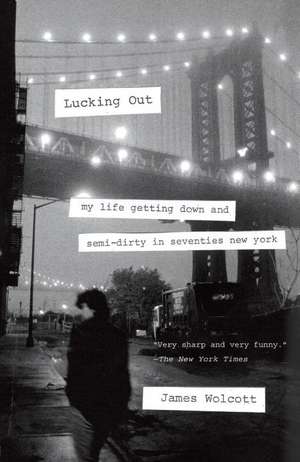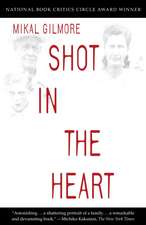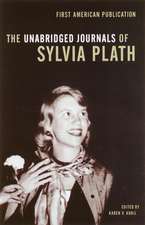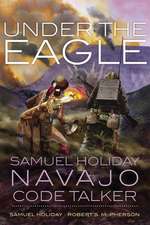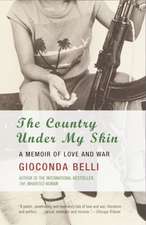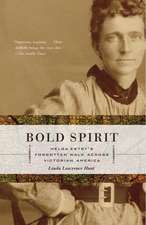Lucking Out: My Life Getting Down and Semi-Dirty in Seventies New York
Autor James Wolcotten Limba Engleză Paperback – oct 2012
In the autumn of 1972, a very young and green James Wolcott arrived in New York from Maryland, full of literary dreams, equipped with a letter of introduction from Norman Mailer, and having no idea what was about to hit him. Landing at a time of accelerating municipal squalor and, paradoxically, gathering cultural energy in all spheres as "Downtown" became a category of art and life unto itself, he embarked upon his sentimental education, seventies New York style. This portrait of a critic as a young man is also a rollicking, acutely observant portrait of a legendary time and place. Mixing grit and glitter in just the right proportions, suffused with affection for the talented and sometimes half-crazed denizens of the scene, it will make readers long for a time when you really could get mugged around here.
Preț: 103.66 lei
Nou
Puncte Express: 155
Preț estimativ în valută:
19.83€ • 20.71$ • 16.38£
19.83€ • 20.71$ • 16.38£
Carte disponibilă
Livrare economică 25 martie-08 aprilie
Preluare comenzi: 021 569.72.76
Specificații
ISBN-13: 9780767930628
ISBN-10: 0767930622
Pagini: 258
Dimensiuni: 138 x 202 x 19 mm
Greutate: 0.28 kg
Editura: Anchor Books
ISBN-10: 0767930622
Pagini: 258
Dimensiuni: 138 x 202 x 19 mm
Greutate: 0.28 kg
Editura: Anchor Books
Notă biografică
JAMES WOLCOTT is a longtime columnist and blogger for Vanity Fair. He is the author of a novel, The Catsitters, and the nonfiction work Attack Poodles and Other Media Mutants. He lives in New York with his wife, the critic and novelist Laura Jacobs, and their three ocicats, Jasper, Henry, and Veronica.
Extras
It was like seeing my own ghost, the Spirit of Punk Past. I was home, dawdling across the cable- TV dial, when I was arrested by the sight of a host of once- familiar faces, a few of them sporting incongruous New Year’s Eve hats and leis. Incongruous, not because it wasn’t New Year’s Eve, but because of the lean, lunar faces jutting under the hats. These were not faces normally associated with holiday mirth. Fervent intent was usually more like it, furry heads and furrowed brows. I identified the bleached- out footage as being shot along the bar at CBGB’s, some of the faces belonging to Tom Verlaine (sitting on an actual bar stool, like a normal person), Richard Hell, Richard Lloyd, Billy Ficca, John Cale, Deborah Harry, Chris Frantz, Tina Weymouth, the journalist Lisa Robinson, and Lenny Kaye. And then, a flash of light and gone, there I was: me—the me I once was, one of the milling crowd, part of the scene. Chatting with someone at the only place where my memories are three-dimensional, a hologram in my head that still feels like a crummy home movie.
The film— run on the Independent Film Channel— was Amos Poe and Ivan Kral’s Blank Generation, a music documentary shot mostly in the loose bowels of the Bowery, its title taken from a song by the sun- glassed poet, mouth- grimacing virtuoso, and inadvertent style setter Richard Hell, whose torn T- shirt bearing the inviting plea “Please Kill Me” proved to be one of the period’s most enduring fashion statements, along with laced- tight bondage gear tricked out as smart evening wear. Filmed in black and white with no live- synced sound (the songs draped over the images like a scratchy, patchy car-pet), Blank Generation jerked along like a home movie even back then and today looks like an archaeological find, a kinescope discovered in a salvage yard recording the last known sightings from that prelapsarian age when un- trust- funded artists still coyoted the streets and, be it ever so humble, every hovel felt like home. I had forgotten I was in Blank Generation, however fleetingly, and seeing myself again as if for the first time didn’t make me mourn Lost Youth, that not being my preferred form of masochism; it made me smile. It was like a college yearbook come alive. Here were my fellow classmates, the old alma mater in its midnight glory.
Arabian swelter, and with the air- conditioning broken, CBGB resembled some abattoir of a kitchen in which a bucket of ice is placed in front of a fan to cool the room off. To no avail, of course, and the heat had perspiration glissading down the curve of one’s back, yeah, and the cruel heat also burned away any sense of glamour. After all, CBGB’s Bowery and Bleecker location is not the garden spot of lower Manhattan, and the bar itself is an uneasy oasis. On the left, where the couples are, tables; on the right, where the stragglers, drinkers, and love- seekers are, a long bar; between the two, a high doublebacked ladder which, when the room is really crowded, offers the best view. If your bladder sends a distress signal, write home to your mother, for you must make a perilous journey down the aisle between seating area and bar, not knocking over any mike stands as you slide by the tiny stage, squeeze through the pile of amplifiers, duck the elbow thrust of a pool player leaning over to make a shot . . . and then you end up in an illustrated bathroom that looks like a page that didn’t make [Norman Mailer’s] The Faith of Graffiti.
— from my Village Voice piece “A Conservative Impulse in the
New Rock Underground” (August 18, 1975)
From the Hardcover edition.
The film— run on the Independent Film Channel— was Amos Poe and Ivan Kral’s Blank Generation, a music documentary shot mostly in the loose bowels of the Bowery, its title taken from a song by the sun- glassed poet, mouth- grimacing virtuoso, and inadvertent style setter Richard Hell, whose torn T- shirt bearing the inviting plea “Please Kill Me” proved to be one of the period’s most enduring fashion statements, along with laced- tight bondage gear tricked out as smart evening wear. Filmed in black and white with no live- synced sound (the songs draped over the images like a scratchy, patchy car-pet), Blank Generation jerked along like a home movie even back then and today looks like an archaeological find, a kinescope discovered in a salvage yard recording the last known sightings from that prelapsarian age when un- trust- funded artists still coyoted the streets and, be it ever so humble, every hovel felt like home. I had forgotten I was in Blank Generation, however fleetingly, and seeing myself again as if for the first time didn’t make me mourn Lost Youth, that not being my preferred form of masochism; it made me smile. It was like a college yearbook come alive. Here were my fellow classmates, the old alma mater in its midnight glory.
Arabian swelter, and with the air- conditioning broken, CBGB resembled some abattoir of a kitchen in which a bucket of ice is placed in front of a fan to cool the room off. To no avail, of course, and the heat had perspiration glissading down the curve of one’s back, yeah, and the cruel heat also burned away any sense of glamour. After all, CBGB’s Bowery and Bleecker location is not the garden spot of lower Manhattan, and the bar itself is an uneasy oasis. On the left, where the couples are, tables; on the right, where the stragglers, drinkers, and love- seekers are, a long bar; between the two, a high doublebacked ladder which, when the room is really crowded, offers the best view. If your bladder sends a distress signal, write home to your mother, for you must make a perilous journey down the aisle between seating area and bar, not knocking over any mike stands as you slide by the tiny stage, squeeze through the pile of amplifiers, duck the elbow thrust of a pool player leaning over to make a shot . . . and then you end up in an illustrated bathroom that looks like a page that didn’t make [Norman Mailer’s] The Faith of Graffiti.
— from my Village Voice piece “A Conservative Impulse in the
New Rock Underground” (August 18, 1975)
From the Hardcover edition.
Recenzii
A Slate Best Book of the Year
Praise for Lucking Out:
“Very sharp and very funny.” —The New York Times
“The Village Voice in the 1970s, Patti Smith and the punk scene, porno theaters in Times Square, Pauline Kael and her acolytes—New York City journalism at its gossipy best.”
—Slate
“Superb.”
—The Wall Street Journal
“[A] swooping carnival ride of a book. . . . Compared with James Wolcott, most literary journalists write like Amish farmers, their sentences plain as bib overalls. . . . Memoirs don’t come more entertaining than this.”
—Washington Post
“Here is a young writer’s journey through that shitty, wonderful New York of yore, the one that’s been marketed and re-enacted and curated almost out of actuality, but really did exist. James Wolcott’s tough, stylish and genuine criticism has always been indispensable, but even so this book is revelatory in its intimacy, its sharpness and humor, and its grim good cheer. To experience this era through Wolcott’s worldview and prose is a true pleasure.”
—Sam Lipsyte, author of The Ask
“I gobbled up Lucking Out, reading it in one sitting. It’s a candid, hysterically funny seventies memoir of downtown and uptown Manhattan, by one of the few sober guys in the room.”
—Legs McNeil, coauthor of Please Kill Me: The Uncensored Oral History of Punk
“What ultimately makes this book so vital is its documentation of one writer’s beginnings. Beneath the scrapbook of memories lies a sneaky defense of a scrappy literary life that is in danger of fading into the same oblivion as Mohawk haircuts and black leather jackets adorned with safety pins.”
—Los Angeles Times
“Wolcott captures the sense of outlaw possibility and physical menace in a city that has ‘gone to hell,’ [but] his book is also something else: a tale of survival in one of the city’s more peculiar tribes. . . . Though today’s New York is outwardly more generic, much hasn’t changed, especially how most of us are still lucking out.”
—The New Yorker’s Book Bench
“Who better to guide us through one of our most irresistible moments—New York in the Seventies—than one of our most irresistible critics, James Wolcott? Here is an intimate, delicious chronicle of America’s greatest city in full cultural bloom and total municipal decay. It’s Rome Before the Fall, and Wolcott, a hilarious and penetrating writer, captures it in all of its seedy, seductive glamour.”
—Jonathan Mahler, author of Ladies and Gentlemen, the Bronx Is Burning
“An adventurous intellectual spy report. . . . From Pauline Kael’s opinion of hetero porn movies to the gay ‘trucks,’ from the New York City Ballet to CBGB’s, Wolcott delightfully proves that critics have feelings too.”
—John Waters
“A superb eyewitness account of New York in the raw. James Wolcott scrapes the barnacles off the 1970s and reveals a gem—a decadent time that somehow seems innocent today. His joyride vividly captures the circus of druggies, punks and geniuses with their driving needs to express themselves.”
—Ivan Kral, cofilmmaker of The Blank Generation and guitarist for the Patti Smith Group
“A sleek, funny memoir. . . . Rough joy is borne out in Wolcott’s bubbling pace, in his invariable preference for amusing modesty over mythological grandeur, and, most admirably, in the delicate candor with which he treats the cruelty and competitive savagery of that decade in New York.”
—Dave Hickey, author of Air Guitar
“Any book that includes Milt Kamen, Patti Smith, the New York City Ballet, and Ugly George has already proven its worth as the record of a cultural moment. But I’d rather recommend it for the way Wolcott reminds us that what is right about something is often harder to explain than what is wrong, and that humility in the presence of real art offers us a path to keener discernment and higher excitement. In cynical times like ours, this generous book is a gift.”
—Michael Tolkin, author of The Player
"Lucking Out: My Life Getting Down And Semi-Dirty In Seventies New York lays out its time vividly; the various milieus Wolcott describes are clear and memorable.”
—Onion A.V. Club
"Grunge, glitz, and gossip decorate this lively...memoir....Wolcott cameos celebrities from Bob Dylan and Gore Vidal--he doesn't so much drop names as spike them like a running back in the end zone--to the glamorous, squalid city itself, with its crime and crazies and open-air gay trysting....Wolcott's take on New York culture itself, from schlubby porn impresarios to diaphanous ballerinas, is entertaining and evocative."
—Publishers Weekly
"No fan of memoirs, Vanity Fair cultural critic Wolcott has nonetheless written one about his wonder years in New York City in the 1970s. Given his role as tastemaker in writing about music, movies, television, and books, Wolcott presents both a self-portrait as a novice arts journalist and a portrait gallery of the scene makers during the heyday of consequences-be-damned criticism. With some offhand encouragement from Norman Mailer, Wolcott quixotically quit college, moved to New York, and badgered his way into a job at the then enormously influential Village Voice. His hilarious account of his trial by fire at this veritable “gladiator school” for journalism is acidly revealing of the dynamics at work in crisis-riddled New York, a crucible for gutsy creativity. Wolcott incisively celebrates such key figures as Patti Smith and David Byrne, caustically annihilates prominent writers, and praises to the skies his guiding light, film critic extraordinaire Pauline Kael. A work of mettlesome personal remembrance and piercing cultural history, Wolcott’s electrifying tale of the forging of a writer can also serve as a course on writing laser-precise and propulsive prose."
—Booklist
"Longtime Vanity Fair cultural critic Wolcott (Attack Poodles and Other Media Mutants, 2004, etc.) celebrates the Big Apple as a haven for the writers, artists, musicians and eccentrics who thrived at its core in the 1970s. Of the many sentences in Wolcott’s memoir that will have contemporary Manhattan-philes gnashing their teeth in envy is this one recounting how the author dealt with losing his on-site staff job at the Village Voice: “From that point onward I never worked a regular office job again, solely writing for a living, something that would have been impossible if New York hadn’t been a city of low rents and crappy expectations that didn’t require a trust fund or a six-figure income for the privilege of watching everything fall apart before your eyes.” Actually, the entire book is not only a bittersweet valentine to a much-maligned era but a model of exemplary prose that any writer would do well to study. Wolcott’s talent for choosing words, shaping sentences, constructing paragraphs and crafting each of the five sections into an essay that stands on its own reveals an architectonic approach lacking in many current memoirs. The author also understands how to apply his individual experiences to the larger context of the zeitgeist. For example, the section entitled “Bodily Contact” weaves personal encounters into a critique of “Me Decade” sexual mores, drawing on Bob Fosse films, the seedy atmosphere of pre–tourist friendly Times Square, the emerging gay-rights movement and concerns about the dark side of the pick-up culture prevalent at both straight and gay bars. Wolcott also rubbed shoulders with the luminaries of the day, including his mentor, the rabble-rousing author Norman Mailer, punk songstress Patti Smith and legendary movie critic Pauline Kael. His poignant reminiscences of Kael pave the way for the book’s plaintive conclusion. Gives the lie to the belief that the ’70s contained nothing but disco decadence and self-help solipsism."
—Kirkus Reviews (starred)
Praise for Lucking Out:
“Very sharp and very funny.” —The New York Times
“The Village Voice in the 1970s, Patti Smith and the punk scene, porno theaters in Times Square, Pauline Kael and her acolytes—New York City journalism at its gossipy best.”
—Slate
“Superb.”
—The Wall Street Journal
“[A] swooping carnival ride of a book. . . . Compared with James Wolcott, most literary journalists write like Amish farmers, their sentences plain as bib overalls. . . . Memoirs don’t come more entertaining than this.”
—Washington Post
“Here is a young writer’s journey through that shitty, wonderful New York of yore, the one that’s been marketed and re-enacted and curated almost out of actuality, but really did exist. James Wolcott’s tough, stylish and genuine criticism has always been indispensable, but even so this book is revelatory in its intimacy, its sharpness and humor, and its grim good cheer. To experience this era through Wolcott’s worldview and prose is a true pleasure.”
—Sam Lipsyte, author of The Ask
“I gobbled up Lucking Out, reading it in one sitting. It’s a candid, hysterically funny seventies memoir of downtown and uptown Manhattan, by one of the few sober guys in the room.”
—Legs McNeil, coauthor of Please Kill Me: The Uncensored Oral History of Punk
“What ultimately makes this book so vital is its documentation of one writer’s beginnings. Beneath the scrapbook of memories lies a sneaky defense of a scrappy literary life that is in danger of fading into the same oblivion as Mohawk haircuts and black leather jackets adorned with safety pins.”
—Los Angeles Times
“Wolcott captures the sense of outlaw possibility and physical menace in a city that has ‘gone to hell,’ [but] his book is also something else: a tale of survival in one of the city’s more peculiar tribes. . . . Though today’s New York is outwardly more generic, much hasn’t changed, especially how most of us are still lucking out.”
—The New Yorker’s Book Bench
“Who better to guide us through one of our most irresistible moments—New York in the Seventies—than one of our most irresistible critics, James Wolcott? Here is an intimate, delicious chronicle of America’s greatest city in full cultural bloom and total municipal decay. It’s Rome Before the Fall, and Wolcott, a hilarious and penetrating writer, captures it in all of its seedy, seductive glamour.”
—Jonathan Mahler, author of Ladies and Gentlemen, the Bronx Is Burning
“An adventurous intellectual spy report. . . . From Pauline Kael’s opinion of hetero porn movies to the gay ‘trucks,’ from the New York City Ballet to CBGB’s, Wolcott delightfully proves that critics have feelings too.”
—John Waters
“A superb eyewitness account of New York in the raw. James Wolcott scrapes the barnacles off the 1970s and reveals a gem—a decadent time that somehow seems innocent today. His joyride vividly captures the circus of druggies, punks and geniuses with their driving needs to express themselves.”
—Ivan Kral, cofilmmaker of The Blank Generation and guitarist for the Patti Smith Group
“A sleek, funny memoir. . . . Rough joy is borne out in Wolcott’s bubbling pace, in his invariable preference for amusing modesty over mythological grandeur, and, most admirably, in the delicate candor with which he treats the cruelty and competitive savagery of that decade in New York.”
—Dave Hickey, author of Air Guitar
“Any book that includes Milt Kamen, Patti Smith, the New York City Ballet, and Ugly George has already proven its worth as the record of a cultural moment. But I’d rather recommend it for the way Wolcott reminds us that what is right about something is often harder to explain than what is wrong, and that humility in the presence of real art offers us a path to keener discernment and higher excitement. In cynical times like ours, this generous book is a gift.”
—Michael Tolkin, author of The Player
"Lucking Out: My Life Getting Down And Semi-Dirty In Seventies New York lays out its time vividly; the various milieus Wolcott describes are clear and memorable.”
—Onion A.V. Club
"Grunge, glitz, and gossip decorate this lively...memoir....Wolcott cameos celebrities from Bob Dylan and Gore Vidal--he doesn't so much drop names as spike them like a running back in the end zone--to the glamorous, squalid city itself, with its crime and crazies and open-air gay trysting....Wolcott's take on New York culture itself, from schlubby porn impresarios to diaphanous ballerinas, is entertaining and evocative."
—Publishers Weekly
"No fan of memoirs, Vanity Fair cultural critic Wolcott has nonetheless written one about his wonder years in New York City in the 1970s. Given his role as tastemaker in writing about music, movies, television, and books, Wolcott presents both a self-portrait as a novice arts journalist and a portrait gallery of the scene makers during the heyday of consequences-be-damned criticism. With some offhand encouragement from Norman Mailer, Wolcott quixotically quit college, moved to New York, and badgered his way into a job at the then enormously influential Village Voice. His hilarious account of his trial by fire at this veritable “gladiator school” for journalism is acidly revealing of the dynamics at work in crisis-riddled New York, a crucible for gutsy creativity. Wolcott incisively celebrates such key figures as Patti Smith and David Byrne, caustically annihilates prominent writers, and praises to the skies his guiding light, film critic extraordinaire Pauline Kael. A work of mettlesome personal remembrance and piercing cultural history, Wolcott’s electrifying tale of the forging of a writer can also serve as a course on writing laser-precise and propulsive prose."
—Booklist
"Longtime Vanity Fair cultural critic Wolcott (Attack Poodles and Other Media Mutants, 2004, etc.) celebrates the Big Apple as a haven for the writers, artists, musicians and eccentrics who thrived at its core in the 1970s. Of the many sentences in Wolcott’s memoir that will have contemporary Manhattan-philes gnashing their teeth in envy is this one recounting how the author dealt with losing his on-site staff job at the Village Voice: “From that point onward I never worked a regular office job again, solely writing for a living, something that would have been impossible if New York hadn’t been a city of low rents and crappy expectations that didn’t require a trust fund or a six-figure income for the privilege of watching everything fall apart before your eyes.” Actually, the entire book is not only a bittersweet valentine to a much-maligned era but a model of exemplary prose that any writer would do well to study. Wolcott’s talent for choosing words, shaping sentences, constructing paragraphs and crafting each of the five sections into an essay that stands on its own reveals an architectonic approach lacking in many current memoirs. The author also understands how to apply his individual experiences to the larger context of the zeitgeist. For example, the section entitled “Bodily Contact” weaves personal encounters into a critique of “Me Decade” sexual mores, drawing on Bob Fosse films, the seedy atmosphere of pre–tourist friendly Times Square, the emerging gay-rights movement and concerns about the dark side of the pick-up culture prevalent at both straight and gay bars. Wolcott also rubbed shoulders with the luminaries of the day, including his mentor, the rabble-rousing author Norman Mailer, punk songstress Patti Smith and legendary movie critic Pauline Kael. His poignant reminiscences of Kael pave the way for the book’s plaintive conclusion. Gives the lie to the belief that the ’70s contained nothing but disco decadence and self-help solipsism."
—Kirkus Reviews (starred)
